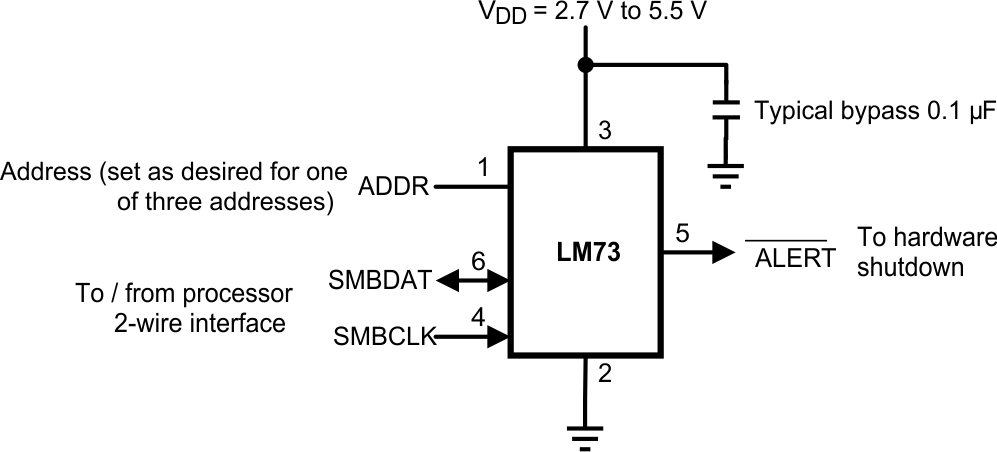SNIS141F October 2005 – October 2015 LM73
PRODUCTION DATA.
- 1 Features
- 2 Applications
- 3 Description
- 4 Revision History
- 5 Pin Configuration and Functions
-
6 Specifications
- 6.1 Absolute Maximum Ratings
- 6.2 ESD Ratings
- 6.3 Recommended Operating Conditions
- 6.4 Thermal Information
- 6.5 Temperature-to-Digital Converter Characteristics
- 6.6 Logic Electrical Characteristics- Digital DC Characteristics
- 6.7 Logic Electrical Characteristics- SMBus Digital Switching Characteristics
- 6.8 Typical Characteristics
- 7 Detailed Description
- 8 Application and Implementation
- 9 Power Supply Recommendations
- 10Layout
- 11Device and Documentation Support
- 12Mechanical, Packaging, and Orderable Information
Package Options
Mechanical Data (Package|Pins)
- DDC|6
Thermal pad, mechanical data (Package|Pins)
Orderable Information
1 Features
- Single Address Pin Offers Choice of Three Selectable Addresses Per Version for a Total of Six Possible Addresses.
- SMBus and I2C-compatible Two-Wire Interface
- Supports 400-Khz Operation
- Shutdown Mode With One-shot Feature Available for Very Low Average Power Consumption
- Programmable Digital Temperature Resolution From 11 Bits to 14 Bits
- Fast Conversion Rate Ideal for Quick Power Up and Measuring Rapidly Changing Temperature
- Open-Drain ALERT Output Pin Goes Active When Temperature is Above a Programmed Temperature Limit
- Very Stable, Low-noise Digital Output
- UL Recognized Component
-
Key Specifications
- Supply Current
- Operating
- 320 µA (Typical)
- 495 µA (Maximum)
- Shutdown
- 8 µA (Maximum)
- 1.9 µA (Typical)
- Operating
- Temperature Accuracy
- −10°C to 80°C: ±1.0°C (Maximum)
- −25°C to 115°C: ±1.5°C (Maximum)
- −40°C to 150°C: ±2°C (Maximum)
- Resolution
- 0.25°C to 0.03125°C
- Conversion Time
- 11-Bit (0.25°C): 14 ms (Maximum)
- 14-Bit (0.03125°C): 112 ms (Maximum)
- Supply Current
2 Applications
- Portable Electronics
- Notebook Computers
- Automotive
- System Thermal Management
- Office Electronics
3 Description
The LM73 is an integrated, digital-output temperature sensor featuring an incremental Delta-Sigma ADC with a two-wire interface that is compatible with the SMBus and I2C interfaces. The host can query the LM73 at any time to read temperature.
Available in a 6-pin SOT package, the LM73 occupies very little board area while operating over a wide temperature range (–40°C to 150°C) and providing ±1°C accuracy from –10°C to 80°C. The user can optimize between the conversion time and the sensitivity of the LM73 by programming it to report temperature in any of four different resolutions. Defaulting to 11-bit mode (0.25°C/LSB), the LM73 measures temperature in a maximum time of 14 ms, making it ideal for applications that require temperature data very soon after power-up. In its maximum resolution, 14-bit mode (0.03125°C/LSB), the LM73 is optimized to sense very small changes in temperature.
A single multi-level address line selects one of three unique device addresses. An open-drain ALERT output goes active when the temperature exceeds a programmable limit. Both the data and clock lines are filtered for excellent noise tolerance and reliable communication. Additionally, a time-out feature on the clock and data lines causes the LM73 to automatically reset these lines if either is held low for an extended time, thus exiting any bus lock-up condition without processor intervention.
Device Information(1)
| PART NUMBER | PACKAGE | BODY SIZE (NOM) |
|---|---|---|
| LM73 | SOT (6) | 2.90 mm × 1.60 mm |
- For all available packages, see the orderable addendum at the end of the datasheet.
Typical Application

4 Revision History
Changes from E Revision (January 2015) to F Revision
- Changed Temperature Accuracy spec typo on the front pageGo
Changes from D Revision (May 2009) to E Revision
- Added Pin Configuration and Functions section, ESD Ratings table, Feature Description section, Device Functional Modes, Application and Implementation section, Power Supply Recommendations section, Layout section, Device and Documentation Support section, and Mechanical, Packaging, and Orderable Information section Go